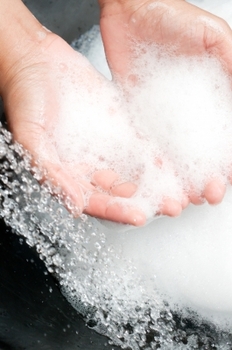Fear. It’s everywhere. Especially when it comes to our health. And nothing seems to be more widespread than our culture’s fear of germs. Ads on television, billboards, and magazines teach us that germs are scary, dangerous, and an imminent threat to our livelihoods. As a result, most people are very conscious about protecting themselves through antibacterial sprays, antibacterial soaps, and even antibacterial pillowcases. Notice a common theme?
The chemical used in antibacterial products is a pesticide called Triclosan, and it’s found in a variety of consumer products throughout the house. In everything from mattresses and towels, to sponges and soaps, to home furnishings and personal care products. This list is nearly endless and represents the growing fear of bacterial exposure.
Who could possibly have an issue with killing those yucky germs? Well…
- The FDA found that using antibacterial products at home provides no added benefitcompared to warm water and plain soap.
- The American Medical Association – yes, that AMA – recommends against the use of triclosan in the home because of the increased risk of creating antibiotic-resistant superbugs.
- Me. See below.
The reality is that antibacterial products don’t protect people better than plain old soap and water. Instead, it contributes to the rising incidence of antibiotic-resistant superbugs by allowing the surviving bacteria to adapt to our medical weapons – afterall, what doesn’t kill them makes them stronger!
That’s not all – antibacterial products kill the good bacteria, too, which leads to immune system and digestive system problems. Additionally, the Environmental Working Groupfound triclosan to be a hormone-disruptor, altering hormone activity in the body and potentially contributing to thyroid disease, liver toxicity, and cancer.
Still afraid of germs? The truth is your body has a complex immune system capable of fighting off most, if not all, bacteria and viruses. The key is preparing it with proper nutrition, exercise, a positive mental attitude, sleep, and chiropractic care – all of which help your body function properly.
You should also take the following steps:
- Avoid antibacterial soaps and detergents. Just use soap and warm water.
- Use the EWG’s Skin Deep cosmetic database to check your personal care products for harmful ingredients.
- Read the EWG’s Guide on Triclosan
- Take probiotics. If you’ve ever been on an antibiotic or been exposed to antibacterial products, you should take a probiotic supplement to replenish your supply of good bacteria.
Remember, your health is not dependent on killing all of the germs around you. Being healthy is based on how well your body interacts with the environment. The stronger your body, the better it can deal with foreign bodies, like germs, and the less you get sick! Live a healthy lifestyle and get adjusted!


Recent Comments